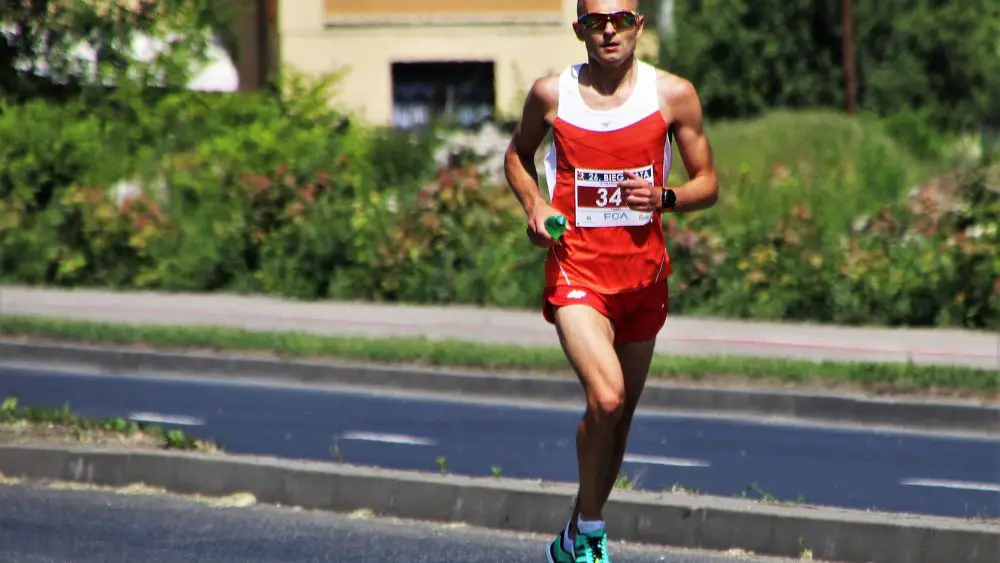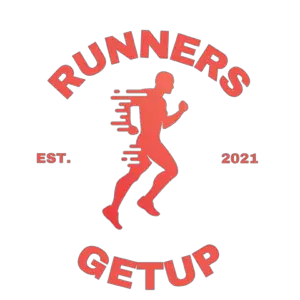This post contains affiliate links.

A concrete intra-marathon nutrition plan is a must-have for any runner. The energy needed for the 26.2 miles of the track must be met with snacks and proper hydration throughout the race. However, many runners fail to realize the importance of this, and just randomly pick whatever they can bring to the event.
In general, you should eat fast-response carbs that are easy to store and eat while running a marathon. Not only that, but good hydration is also necessary to keep for thermal regulation and prevention of dehydration risks.
Ahead, we’re going to discuss how you should refuel during the marathon. We’re also going to talk about intra-marathon hydration as well as look at the best intra-run snacks so you know what to pack on race day.
How Should I Fuel During a Marathon?
How you should fuel during the run is on a case-to-case basis. Different runners have different bodies after all. However, one thing is common: the food you munch on should be light and easy to carry but are rich in carbs.
Carbohydrates are the most important macronutrient for a runner. It provides glucose and glycogen reserves to the body which serves as the fuel for the muscles you’ll use to propel you through the race.
During a marathon in which your muscles are worn out to their limits, carbohydrate intake is very important. This avoids the risk of hypoglycemia (lowering of glucose levels) which may cause weakness, blurry eyesight, and confusion. Also, consuming carbs during this time helps in maintaining your running pace.
Ideally, your carb-loading phase should start 3-4 days before the marathon and not during the marathon itself. This is to store readily available glycogen in your muscles which you can use for the race. The intra-marathon snacks are just there as a support to your body’s high-energy needs during the race.
I’ve actually made an article that talks about what to eat before a marathon which dives deeply into carb-loading. I highly recommend you check that out.
Amount to Take
According to research in 2014 regarding carbohydrate intake, it is recommended to take up around 60-90 grams of carbs per hour for ultra-endurance events. Thus, consuming around 30 grams of carbs every 30 minutes is a good idea to keep your body going.
Doing so will prolong the onset of muscle fatigue by up to 20% during the run, leading to better pacing and recovery. Not only that, but it will be a good substitute for the energy lost during the event.
Sticking to the Plan
A common mistake that runners make is that they try new snacks on race day. This habit must be avoided so that your body won’t need to adjust to any unexpected changes.
You should be able to know what works best for your body during the training period. If you feel very tired after the run, then you might want to add more carbs during the marathon and reduce it if you feel bloated.
Some good ideas on what to eat include sports gels, sports gummies, bananas, raisins, and energy bars.
What Foods to Avoid During a Marathon
Carbs are your friends during a marathon. But what about your body’s enemies? In this article, we will take a look at some foods that you should straight-up steer away from.
Fatty Foods
Fatty foods are those that are rich in fat or deep fried with oil. Yes, they indeed contain lots of energy, but they also have a fair share of disadvantages.
For starters, fried foods are riddled with hard-to-digest lipids that may stay in your tummy for a long time. Snacking on them during the run means that you risk indigestion that which can quickly become an upset stomach.
Not only that, but fatty foods are also not recommended for endurance athletes. It increases the risk of cardiovascular issues which poses problems for runners who make full use of their cardiovascular system regularly.
Protein Bars
Protein bars pack a lot of energy and they are easy to carry. But, you should not be tempted by its portability and flavor. Often, these have sweeteners such as sorbitol and mannitol. They are the main culprits for many tummy issues such as gas, pains, and even bloating.
If you want to run at an optimal rate, you should never be bloated during a marathon. Thus, it is better to avoid protein bars. Furthermore, your focus should be on carbs which will help you stay on track with lesser body pains and aches.
Spicy Food
There’s a myth among runners that spicy food can make them more active during the run and will lead to better performance. However, the reality is these types of intra-marathon snacks should be avoided since they can result in an upset stomach and will cause your temperature levels to rise.
Excessive sweating is a direct result of capsaicin which is the substance that makes chili spicy. It messes up thermal regulation which may lead to the need for more water intake. Not to mention, it’s very uncomfortable to run or do anything for that matter with a burning tongue.
Fiber-Rich Snacks
Compared to carbs which the body can break down into sugar molecules, Fiber is different. Our body cannot convert it into glucose normally, and so, it becomes tougher to digest. For this reason, runners must steer clear of fiber as it may lead to unwanted bathroom breaks during the competition.
Hydration: Plain Water vs. Sports Drinks
Hydration is a crucial part of the race routine apart from nutrition. It keeps body temperature regulated and removes risks of dehydration which is very deteriorating for a runner.
The American College of Sports Medicine suggests drinking water frequently during exercise to compensate for lost bodily fluids. This means around 5 to 12 ounces or 145 ml to 350 ml of water every 20 minutes.
Furthermore, they recommend incorporating electrolytes/carbohydrate drinks for ultra-endurance exercises for marathons as it enhances general performance. Not only that, but water delivery does not change even if you are consuming sports drinks.
A good routine is to chug water in 3 large gulps every 15 minutes. This will allow the healthy replacement of fluids without disrupting your run. Also, avoid engaging with sugary drinks such as diet soda and fruit-based drinks as the sugar can mess up your gut.
As for choosing between plain water and sports drinks, you should stick to the hydration substance you use during your training. This will allow your body to be familiar with the fluid and foster optimal running capabilities.
Remember that the stomach can be trained to consume different nutrients during your training phase. As such, be wary of your body and always follow its calls.
Best Intra Run Snacks
Your intra-run snack should have a balance between portability and carbohydrate content. You will be running while eating, so it’s better to keep it small. This means that no matter how you crave that pasta snack in the middle of the run, it is impossible to do.
Here are some lightweight snacks that will keep you fueled:
#1 Bananas
Bananas, apart from being easy to carry around, are also rich in carbohydrates. A medium ripe banana provides around 23 grams of carbohydrates which is more than enough for 30 minutes of fuel during a run.
They also contain a good amount of potassium which regulates nerves and balances movement. With potassium, you can avoid unwanted muscle cramps and abnormal heart rates which are very dangerous conditions to have during a race.
#2 Sports Gels
Sports gels, otherwise known as runner gels, are food supplements in a semi-liquid form that provide a lot of nutrients. They have ample carbohydrates in them (up to 23 grams) per ounce which is very helpful for storing muscle energy.
The semi-liquid form also means that they are easier to digest and absorb compared to solid sports snacks. Also, they are packed in small containers for ease of handling.
#3 Raisins
It may sound weird, but sun-dried raisins have the same benefits as sports jellies when eaten during a marathon. Furthermore, they are natural and cost-effective, meaning that they have fewer preservatives in them.
1 serving of sun-dried raisins has around 25 grams of carbs which is good for glycogen recovery during a marathon. You can even ziplock and bring as much as you want to the race.
#4 Pretzels
Pretzels are easy-to-digest carbs that will be useful for an intra-run snack. They provide a burst of energy and are very portable. If you want to increase sodium intake a bit, you can even opt for salty pretzels.
These have around 80 to 90 grams of carbohydrates per 80 grams. That is a lot of carbs for a lightweight snack!
#5 Gummy Bears
These are the crowd favorites in terms of intra-run snacks. After all, who does not love a good amount of gummy bears in their mouth? Gummy bears contain around 98 grams of carbs per 100 grams, so bringing just a few pieces will suffice.
Just don’t overeat these cute snacks as they can be unhealthy in excess.
Final Thoughts
Always pay attention to your nutrition and hydration during the race. It might spell the difference between finishing strong and not finishing at all. Carbs are your friend, but make sure to consume them moderately.
If torn between sports drinks and water, always stick to what you are used to during training. Lastly, it does not hurt to fuel up regularly towards the finish line. As always, have a fun and safe run out there!
